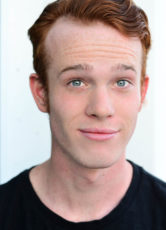
There’s no one quite like Christopher Walken. With his unusual speaking manner, fresh take on body language, and command over his characters, the New York native keeps audiences captivated whether they’re disturbed, frightened, or laughing. How does he do it?
Walken came from a show-business family in Queens. As a kid in the 50s, he joined a touring circus, attended dancing school on the weekends and did some catalog modeling. But the eccentric actor insists his training was in musical comedy theater — what he describes as “singing and dancing and showing off.” Because he was in the business and knew so many people, he was allowed to stand in the back of the theater to watch countless Broadway hits during his youth. Walken says he became an actor “by accident,” and ever since, he’s been creating unforgettable moments on the silver screen. He explains, “I got to playing villains, I don’t know how. I think it’s like anything else — in the movies, in particular, if you establish yourself as something and you’re lucky enough to keep getting hired.”
Here are a number of acting insights, as well as personality quirks of the acting great Christopher Walken.
On punctuation.
“I use punctuation, but I finish the sentence and put [in] a period — but it’s not necessarily where somebody else would. I think everybody should talk the way they want. You go to school and you all sit there and all learn to do the same thing. I guess it’s necessary, but it’s too bad also in a way. Kids, you know, get kind of restrained in a lot of ways. I probably wouldn’t get a job as an English teacher.”
“Somebody said to me that I speak English almost like somebody for whom English is not their first language.”
“Pass the salt.”
“I’ve always been a character actor, although I’m not quite sure what that means. All my scripts are absolutely covered in notes, so any time I say anything — even ‘pass the salt’ — I have six subtexts, comments on what I really mean when I’m saying that. Maybe that’s what gives the impression that I’m saying one thing and thinking something else.”
“I have this theory about words. There are a thousand ways to say ‘Pass the salt.’ It could mean, you know, ‘Can I have some salt?’ or it could mean, ‘I love you.’ It could mean, ‘I’m very annoyed with you.’ Really, the list could go on and on. Words are little bombs, and they have a lot of energy inside them.”
Prep time.
“Acting is a bit like being an athlete. You spend all your time getting ready to do something for two minutes. All the things that made my career in the movies happen took two or three minutes, which is the time that it takes for a take. In that time, something happens. That’s what people know you for — just like someone running the hundred meters.”
“I like to stand in my kitchen with the script on a counter that’s about chest high. Usually, I do something else at the same time—make a chicken or slice vegetables — and all day long, I just read it over and over and over.”
“In the theater, you rehearse for a minimum of five to six weeks. And then you get to play it. Which means you get to get better. That’s the great thing about the theater.”
Quality over quantity.
“It’s not necessarily how many minutes you’re on screen; it’s the material you have. It’s more important what it is you have to do than the amount of time you’re there.”
Learning the lines.
“Acting has to do with saying it as if you meant it, so for me, the words are always very important. It’s very important for me to know my lines—know them so well that I don’t have to think about them. Because if I don’t know my lines, I really don’t know what I’m doing.”
“There’s an impression that actors make a lot of choices. I just take what’s there.”
“Start to say your lines and if it sounds right, usually I stick with that. If it sounds right, it probably is right.”
On building his acting career.
“I look for good possibilities in movies; I don’t look for perfection.”
“A job leads to a job, just like anything else, and it becomes apparent that this was probably what I was going to keep doing.”
“Emotional power is maybe the most valuable thing that an actor can have.”
“I don’t much like being directed. I enjoy being allowed to play.”
“To be honest, I was never very ambitious. And I still am not.”
“There are people who are able to plan their career, their future, but I’ve never had any talent for that. I just do things and hope for the best. Say yes, take a chance, and sometimes it’s terrific and sometimes it’s not.”
What scares him.
“When you’re on stage and you know you’re bombing, that’s very, very scary. Because you know you gotta keep going—you’re bombing, but you can’t stop.”
“I’m scared of everything. I think it’s only sensible to be that way.”
“Even in the limo, I buckle my seatbelt. I got that seatbelt on before the car moves.”
“The last time I did a movie that needed a horse, I said, ‘If it moves, I’m out of here.’ The worst thing is, they know when you’re afraid and act up accordingly. I’ve had them run off on me. Horses I do not like.”
“There are places I don’t want to go. Making movies on tops of mountains, in the desert, playing scenes while icy torrents of river rush by. The jungle. It’s very uncomfortable.”
“I’ve made a couple of movies in the jungle, and I don’t want to go back to the jungle.”
“Guns make me very nervous. They’re dangerous. I’m more of a pacifist than anyone could imagine.”
Advice for life.
“We have no way of knowing what lies ahead for us in the future. All we can do is use the information at hand to make the best decision possible.”
“None of us are getting out of here alive, so please stop treating yourself like an afterthought. Eat the delicious food. Walk in the sunshine. Jump in the ocean. Say the truth that you’re carrying in your heart like a hidden treasure. Be silly. Be kind. Be weird. There’s no time for anything else.”
Want to get your acting career started? Sign up or login to Casting Frontier and start auditioning today!
Related articles:
Tips to Learn a New Skill More Quickly
5 Commercial Acting Tips
Hollywood Roles That Never Happened




